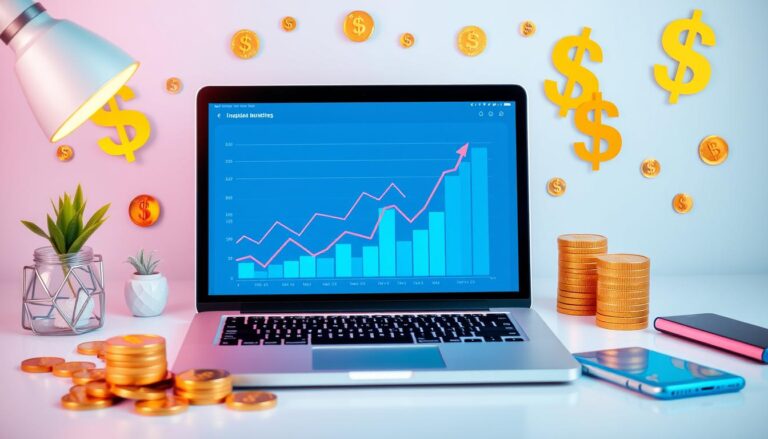Savvy Ways to Save Money During 2024 Inflation
As we face 2024, knowing how to save money during inflation is key. Inflation can reduce our buying power. It’s important to use smart financial strategies to protect our savings.

With today’s economy, being proactive with finances is crucial. By staying updated and adapting, we can make better financial choices. To save during inflation in 2024, we need smart budgeting, clever shopping, and a good grasp of inflation.
Key Takeaways
- Understanding the impact of inflation on purchasing power is crucial for making informed financial decisions.
- Implementing effective inflation savings tips can help protect savings and maintain financial stability.
- Staying informed about the current economic landscape is essential for adapting to changes and making smart financial decisions.
- Smart budgeting and clever shopping strategies are key to saving money during inflation.
- Proactive financial planning is vital for navigating the challenges of 2024 and maintaining financial stability.
- Combining smart financial strategies with a deep understanding of the current inflation landscape can help individuals stay ahead of inflation.
Understanding the Current Inflation Landscape
Inflation is a complex issue that affects economies all over the world. To cut costs and plan finances wisely during inflation, knowing what drives it is key. Recent economic trends and global events have shaped the current inflation scene.
Several factors are pushing 2024 inflation, including economic policies, supply chain problems, and global events. These have raised prices for goods and services. This has reduced purchasing power and hit different income groups in different ways.
Key Factors Driving 2024 Inflation
- Economic policies: Monetary and fiscal policies can influence inflation rates.
- Supply chain issues: Disruptions to global supply chains can lead to price increases.
- Global events: Geopolitical tensions and natural disasters can impact inflation.
How Inflation Affects Your Purchasing Power
Inflation can greatly reduce an individual’s purchasing power. It’s crucial to adjust financial planning during inflation to keep up. As prices go up, the same money can buy less, lowering living standards.
The Impact on Different Income Groups
Inflation affects different income groups differently. Low-income families find it hard to afford basic needs. High-net-worth individuals are less affected. Good cost-cutting strategies can help all income groups deal with inflation.
| Income Group | Impact of Inflation |
|---|---|
| Low-income households | Reduced purchasing power, increased difficulty affording basic necessities |
| Middle-income households | Moderate impact on purchasing power, potential for reduced savings and investments |
| High-net-worth individuals | Minimal impact on purchasing power, potential for increased investment opportunities |
Smart Shopping Strategies in an Inflationary Economy
Smart shopping can really help when budgeting during inflation. Being careful with prices and making smart choices can stretch your money. This way, you can keep your inflation-proof savings safe.
To shop smart, consider these tips:
- Compare prices: Look for the best deals by comparing similar products.
- Use coupons: Use discounts and promotions to cut down on costs.
- Buy in bulk: Buying more now can save money later.
https://www.youtube.com/watch?v=WaUnH8AkUEYKnowing how to shop smart can help you save money. By using these strategies, you can manage your money better. This helps you build inflation-proof savings for the future.
Using these smart shopping tips can help you deal with budgeting during inflation. Every dollar saved is important. Making smart choices can greatly improve your financial health.
| Smart Shopping Strategy | Benefits |
|---|---|
| Comparing prices | Finds the best deals and saves money |
| Using coupons | Reduces expenses and increases savings |
| Buying in bulk | Saves money in the long run and reduces waste |
How to Save Money During Inflation in 2024: Essential Steps
Managing money during inflation needs a smart plan. Start by making a budget that fits your life. This is key to staying financially stable.
Knowing where your money goes helps you cut costs. Essential expenses like housing and food come first. Don’t spend too much on things like entertainment.
Creating an Inflation-Adjusted Budget
Your budget should fight inflation. Use tools to help plan your finances. Here are some tips:
- Track your spending to find ways to save
- Set achievable financial goals for now and later
- Save money automatically to make it easier
Building an Emergency Fund
An emergency fund is your financial backup. Try to save 3-6 months’ worth of living costs. This fund helps with sudden bills and keeps you out of debt.
By taking these steps, you can handle inflation better. And you’ll be on your way to a more secure financial future.
Maximizing Your Income Potential
As inflation goes up, finding ways to boost your income is key. It’s important to save for the future in an economy where prices rise. One good way is to start a side hustle to add to your main income.
Side hustles like freelancing, online tutoring, or selling online can bring in extra cash. This extra money can help you save for the future. Also, don’t forget to ask for a raise at your current job. This can really increase your earnings.
Investment Opportunities
Investing in assets that do well when inflation rises, like real estate or precious metals, is another smart move. When saving in an inflationary economy, look for investments that grow faster than inflation. This way, your money’s value stays strong, even as prices go up.
Career Development
Improving your career can also boost your income. This might mean getting more education, networking, or keeping up with industry trends. Investing in your career can lead to better job opportunities and higher pay in an inflationary economy.
To really increase your income, you need a plan that includes side hustles, salary talks, and smart investments. By taking these steps, you can secure your financial future, even with rising inflation.
| Strategy | Description |
|---|---|
| Exploring Side Hustles | Supplement your primary income with freelance work, online tutoring, or selling products online |
| Negotiating Salary Increases | Discuss a raise with your current employer to increase your primary income |
| Investing in Assets | Invest in assets that historically perform well during periods of inflation, such as real estate or precious metals |
Energy and Utility Cost Reduction Techniques
Lowering energy and utility costs is key to managing expenses in inflation. By using smart cost-cutting strategies, homes can cut down on bills. This frees up money for savings and investments.
Here are some ways to lower your energy and utility bills:
- Choose energy-efficient appliances and lights.
- Get smart home devices to watch and control energy use.
- Renegotiate your utility contracts for better rates.
Making small changes in daily life can also help a lot. For example, turning off lights and electronics when not needed. These cost-cutting strategies help homes save on energy and utilities. This makes it easier to manage expenses in inflation.
By using these methods, homes can control their energy and utility costs. This reduces expenses and helps reach financial goals.
Smart Food Shopping and Meal Planning
Smart food shopping and meal planning are key to saving money. By using smart money-saving techniques, you can cut down on grocery bills. Planning meals around seasonal produce is a great way to save. This method often leads to cheaper and fresher food.
Another smart move is to buy in bulk. Non-perishable items like rice, pasta, and canned goods are cheaper when bought in large amounts. Also, planning meals and using leftovers can help save money and reduce waste.
Bulk Buying Strategies
- Purchase non-perishable items in bulk to reduce waste and save money
- Plan meals around bulk purchases to ensure items are used before expiration
- Consider shopping at wholesale stores or using online retailers for bulk purchases

Seasonal Shopping Tips
Buying seasonal produce can lower your grocery bills and support local farmers. Planning meals with seasonal produce ensures you get fresh, nutritious food while saving money.
Transportation and Commuting Cost Management
Managing expenses in inflation means looking at daily costs, like transportation. By using smart cost-cutting strategies, you can cut down on commuting costs. Try carpooling or public transport to save a lot of money.
Here are some ways to lower transportation costs:
- Negotiate with your vehicle insurance company for the best rates.
- Keep your car in good shape to save on fuel and repairs.
- Walk or bike for short trips to save money and stay healthy.
Using cost-cutting strategies can really help with expenses, especially when you combine them with other ways to manage costs. Simple changes in how you commute can free up money for important financial goals.
Also, with inflation rising, it’s key to keep up with the latest tips on managing transportation costs. Knowing about different commuting options can help you make smart choices and cut down on expenses.
| Transportation Mode | Cost-Effectiveness | Environmental Impact |
|---|---|---|
| Carpooling | High | Low |
| Public Transport | Medium | Medium |
| Walking/Cycling | High | Low |
By adopting these strategies and staying informed, you can manage your transportation costs well. This can positively affect your overall financial health.
Housing Expenses: Finding Hidden Savings
Reducing housing costs is key to saving money. Homeowners can find ways to save by using smart money-saving techniques. One good way is to look into refinancing your mortgage. This can lower your monthly payments.
Home maintenance is another place to find savings. Simple tips like regular checks and DIY fixes can save you money. Here are some tips:
- Regularly inspecting and replacing air filters to improve heating and cooling efficiency
- Sealing air leaks to prevent heat loss
- Using energy-efficient appliances to reduce utility bills
Also, you can save on utility bills. Simple changes like using energy-saving bulbs and adjusting your thermostat can help. These steps can lead to big savings and help you reach your savings goals.

Technology and Subscription Services Optimization
Managing expenses in inflation starts with optimizing technology and subscription services. By using smart cost-cutting strategies, you can lower your spending. This means getting better deals, canceling unused services, and finding cheaper alternatives for software and entertainment.
Here are some ways to optimize your tech and subscription services:
- Review and cancel any unused subscriptions, like streaming services or software
- Try to get better rates from providers, such as your internet or cable company
- Look for free or low-cost options for software and entertainment, like open-source software or public libraries
By using these strategies, you can better manage your expenses in inflation. Experts agree that optimizing your tech and subscription services is a key part of this.
Being proactive about managing expenses in inflation helps you save money and reduce waste. This includes regularly reviewing and optimizing your tech and subscription services. Plus, using other cost-cutting strategies can help too.
Conclusion: Building Financial Resilience in Inflationary Times
As we face the 2024 inflationary challenges, this article has given you a clear guide. It shows how to save money and stay financially stable. By knowing what drives inflation, shopping smart, and making more money, you can get through tough times.
Building financial security in high inflation times needs a detailed plan. Keep an eye on your spending, find new ways to earn, and cut costs in areas like housing and energy. By being proactive and saving money during inflation in 2024 and adopting inflation savings tips, you’ll come out stronger. You’ll be ready to succeed, even when the economy is uncertain.
FAQ
What are the key factors driving inflation in 2024?
Inflation in 2024 is driven by several factors. These include economic policies, global events, and supply chain issues. These elements can lead to higher prices, less buying power, and different effects on people’s incomes.
How can I adjust my spending habits to combat inflation?
To fight inflation, start by making an inflation-adjusted budget. Identify what you really need versus what you can do without. Use smart shopping tactics like comparing prices, using coupons, and buying in bulk.
How can I build an emergency fund to protect myself during economic uncertainty?
Building an emergency fund is key during inflation. Set aside a part of your income each month. Aim for three to six months’ worth of living expenses to protect against financial surprises.
What are some strategies for maximizing my income potential during inflation?
To boost your income, look into side hustles and negotiate salary increases. Also, consider investments that offer returns better than inflation. This can help you deal with rising costs and improve your financial health.
How can I reduce my energy and utility costs during inflation?
To lower energy and utility bills, invest in energy-efficient appliances. Use smart home devices and renegotiate your utility contracts for better rates. These steps can save you money and help you save more for the future.
What are some smart food shopping and meal planning techniques to save money?
For smart food shopping, buy in bulk, shop by season, and reduce food waste. These methods can help you save on groceries without sacrificing nutrition. They contribute to your overall savings against inflation.
How can I manage and reduce my transportation and commuting costs?
To cut down on transportation costs, try carpooling, public transport, and negotiate insurance rates. These steps can save you money and help you reach your financial goals faster.
What are some ways to find hidden savings in my housing expenses?
To uncover savings in housing costs, look into refinancing your mortgage and save on home maintenance. Also, use strategies to lower your utility bills. These can reduce your housing expenses and help you save more for the future.
How can I optimize my technology and subscription services to cut costs?
To save on tech and subscriptions, negotiate better rates, cancel unused services, and find cheaper alternatives. This can help you reduce waste and save money during inflation.






